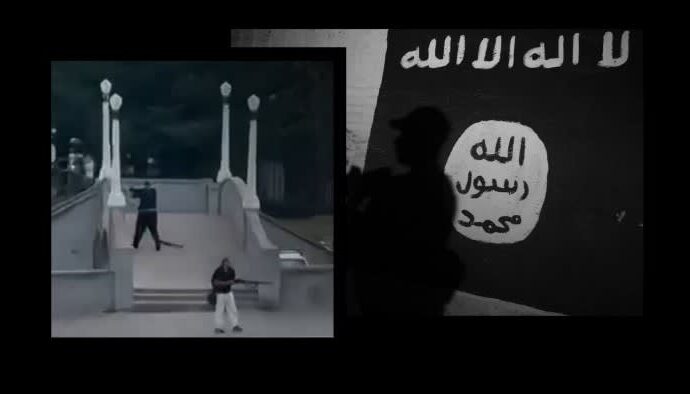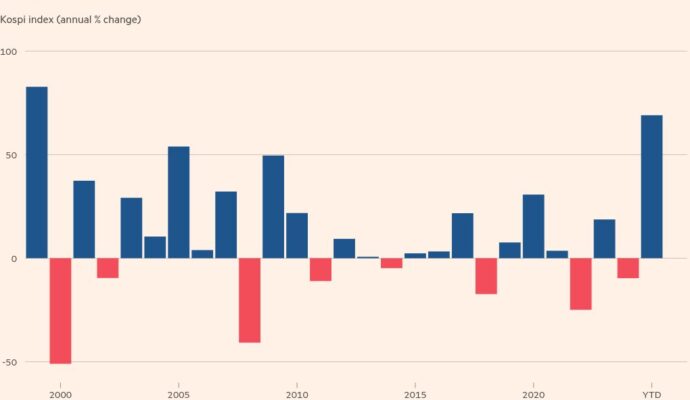Unlock the Editor’s Digest for free
Roula Khalaf, Editor of the FT, selects her favourite stories in this weekly newsletter.
South Korea’s political turmoil has deepened after the fiercely divided nation’s interim leader and the man who was supposed to replace him both resigned within hours of each other.
Prime Minister Han Duck-soo announced his resignation as acting president on Thursday afternoon in order to stand for election to succeed conservative president Yoon Suk Yeol, who was removed last month over his failed attempt to impose martial law last year.
Choi Sang-mok, South Korea’s finance minister, was supposed to take over as acting president from Han, but in a shock move himself resigned on Thursday evening after the opposition-controlled parliament launched fresh impeachment proceedings against him.
Education minister and deputy prime minister Lee Ju-ho took over instead as acting president from midnight on Thursday.
The moves threw Asia’s fourth-largest economy into further political uncertainty.
Han, a career technocrat who has never held elected office, had been expected to steer South Korea through to a presidential election on June 3.
He had been overseeing trade talks with the US, following tariffs enacted by President Donald Trump that have hit South Korea’s export-oriented economy. But he stood down to prepare to stand for president himself, according to people familiar with his thinking.
Lee became the fourth person to act as South Korea’s head of state since December. Choi had already served as interim leader for several months this year after the leftwing-controlled parliament impeached Han over his refusal to fill several spots on the country’s Constitutional Court.
Han told reporters on Thursday that rather than “completing the heavy responsibility that I handle now”, he was resigning in order to “take on an even heavier responsibility”. He is expected to launch his candidacy on Friday.
Choi, in a brief statement to reporters, said: “I apologise to the people for having to resign as I cannot continue to perform my duties amid severe domestic and international economic conditions.”
The resignations came amid growing fears among South Korean conservatives that none of the prospective candidates from Yoon’s People Power party appear capable of mounting a credible challenge to leftwing frontrunner Lee Jae-myung.
Lee was the preferred candidate of 48.5 per cent of respondents to a Realmeter survey released this week. The most popular PPP candidate garnered the support of 13.4 per cent of respondents. Han was not included in the poll.
“Even when Han announces his candidacy, this election will still very much be Lee’s to lose,” said Erik Mobrand, a political scientist at Seoul National University.
Han said on Thursday that South Korea “cannot protect our core interests with irrational, poll-driven economic strategies”, in a thinly veiled reference to Lee’s reputation among critics for economic populism.
“Unless we break free from political extremism and establish a framework for bipartisan co-operation, division and conflict will keep recurring — regardless of who takes power,” he added.
But analysts said the decision of Han, once widely regarded as a bipartisan figure, to leave his post and enter the political arena himself was likely to fuel political divisions.
Opposition politicians have accused Han of using trade negotiations with the US as a springboard for his presidential ambitions, while many on the South Korean left accuse him of playing a prominent role in Yoon’s doomed martial law gambit.
“Han will try to play the role of a unifier less tarnished by partisan associations,” said Mobrand. “But given everything that has happened since Yoon’s martial law declaration, this will be a real stretch.”
In a separate development on Thursday, the country’s supreme court overturned Lee’s recent acquittal on charges of violating electoral laws by “spreading falsehoods”.
While a final verdict is not expected before June’s presidential election, analysts said the ruling could still harm the campaign of Lee. He has past convictions for drink driving and impersonating a prosecutor and faces several other criminal proceedings including charges of illegally remitting funds to North Korea. Lee denies all wrongdoing.


